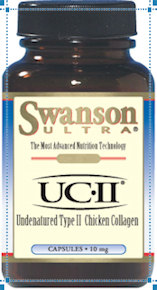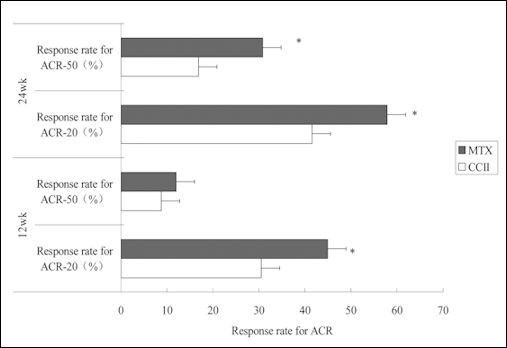Could Over the Counter Undenatured Collagen Supplement (UCII) Treat RA?
 Have you seen a television commercial claiming a supplement “works with your immune system” as an over the counter arthritis treatment? Remembering this brand has been marketed to RA patients, I wondered whether the “improved” product would increase or decrease immune activity. So I looked for research on the ingredient “UCII” (undenatured collagen type II).
Have you seen a television commercial claiming a supplement “works with your immune system” as an over the counter arthritis treatment? Remembering this brand has been marketed to RA patients, I wondered whether the “improved” product would increase or decrease immune activity. So I looked for research on the ingredient “UCII” (undenatured collagen type II).
UCII as a treatment for immune disease
Back in 2009, we heard a lot about type II “chicken collagen” as a possible substance to be used in future Rheumatoid Arthritis treatment. One study in China had examined 500 RA patients. They matched up their chicken collagen product (CCII) against 10 mg of methotrexate for a period of 24 weeks.
They found improvements that “…were statistically significant. In the MTX group, ESR and CRP decreased. RF did not change in either group. At 24 weeks, 41.55% of patients in the CCII group and 57.86% in the MTX group met the American College of Rheumatology 20% improvement criteria (ACR 20) and 16.89% and 30.82%, respectively, met the ACR 50% improvement criteria (ACR 50).”
Could undenatured chicken collagen supplements replace medical treatment for RA?
Study authors believe the collagen from the sternum of chickens had an effect of immune suppression by reducing T-cell activity. (Working against your immune system might have been more accurate for the commercial, but might not sell as well). For many people T-cell activity does mediate immune disease activity – that’s why they respond well to TNF inhibitors like Enbrel or Remicade or to Orencia, which modulates T-cell activation.

As we run out to buy a collagen supplement, let’s remember…
1) For a treatment to be as effective as in the study, the patients and the product should be similar to the study. Do you fit the criteria of those in the study? Is it the same dose? Is the compound you can buy the same as that used in the study? For example, cartilage in the study was carefully refined with a particular method, not heating it past a certain point.
2) Before you add any treatment, no matter where you buy it, research drug interactions and talk with your doctor and pharmacist. This can be critical for either safety or effectiveness reasons.
3) Every treatment whether measured, refined, and tested to the FDA’s satisfaction or not, can have desirable and undesirable effects (side effects). Risks and balances must be weighed.
4) Even with clinical studies, it is difficult to be certain whether a treatment works on RA due to the natural irregular flaring pattern of many patients and heterogeneity of symptoms. Looking at the graph comparing 10 mg of methotrexate to the CCII, we might wonder how many patients would feel better on day 168 without any treatment at all.




Personally, I don’t want to put anything into my body that is made in China, especially medicine. They have a poor track record when it comes to quality control. And I certainly wouldn’t believe a study coming out of there.
I actually ordered this when I was first diagnosed. I had read the study in China so I figured it wouldn’t hurt to add it to the mtx. It didn’t work for me at all….. but the mtx only helped a little also. It wasn’t until I started biologics with mtx that I started feeling better. Because this stuff is pretty harmless I see no reason to try it with current meds (not in place of). Although it was pretty spendy. What I didn’t like was the advertising that it was like a ‘miracle’ cure. Very misleading to new patients that are desperate.
several American brands are now containing this ingredient & I should have made it clear that I did not mention the brand on the TV commercial. I figure lots of people probably see the commercials. 🙂 But it was a common supplement brand and didn’t sound like a cure. I still didn’t buy any though – I don’t respond to TNF’s so it doesn’t seem logical that it would work on me – but maybe?
Continued -I bought an organic product from France available through a Utah based company. Also the study in China put CCII up against MTX and the MTX won. The study was clinically relevant and the underlying theories appeared sound. It was because of this and the trials excerpts from Harvard that I purchased it. A point to remember is that the study was done in 1993 and never moved beyond a phase II study at Harvard. The phase III trial in China in 2009 showed far less efficacy than the first trials (this is why therapies go through trials). In the phase III only 8.81% of participants had an ACR50% improvement at 12 weeks. After 24 weeks this had improved to 16.89%. So basically you have just under a 17% chance for this supplement to make you feel 50% better- AND you need to take it for 6 months first AND you need to take it at the purity and dosage that was used in the trial. Knowing what I know now I would rather try something that has better odds and is regulated. An ACR20 or ACR50 is certainly better than nothing, but not so great if one is completely debilitated and in constant pain. When I look at new upcoming things I go straight to the ACR70 and major clinical response. One drug I’ve been watching closely is the JAK inhibitor by Galapagos- it is showing a very good safety profile and the best response rates I’ve ever seen. The fact that it has sold to Abbott for something like 150 million recently (contingent on the next trial phase) makes me very hopeful…..and wish I’d purchased stock 🙂
Hi Kelly,
I read through the publication on the chicken collagen. From my trained scientific and statistical eye, methotrexate beat chicken collagen hands down. While the study seems to have been well planned and conducted the authors made a stretch in their reasoning on the conclusion. It seems their claim of chicken collagen effectiveness is predicated on an assumption that a placebo group would’ve shown no improvement. I’ve seen many placebo controlled RA trials where there was positive response with the placebo (see example references below). Since this trial did not include a placebo group they have nothing to compare the chicken collagen group against to make the claim that it provides benefit. Thus, it is disingenuous to conclude that chicken collagen is effective because they saw patients improve in that arm.
The stomach does a pretty damn good job of denaturing and chewing up proteins. That’s what the proteases in the stomach are supposed to do. I find it highly unlikely that any significant fragment of the protein would make it through the gut unscathed and then some how interrupt the immune response to self antigens or of auto-antibodies or etc. If there is some way for this to happen, then I highly doubt that chicken collagen would be any more special than any other source of protein.
Save your money and spend it on a nice roasted chicken dinner instead. It sure would be more satisfying than a pill. Yum!
Example references for placebo arms improvement in RA trials:
Kremer, J.M. et al. (2009) The safety and efficacy of a JAK inhibitor in patients with active Rheumatoid arthritis. Arthritis Rheum. 60, 1895–1905
Coombs, J.H. et al. (2009) Improved pain, physical functioning, and health status in rheumatoid arthritis patients treated with CP-690,550, an orally active Janus kinase (JAK) inhibitor: results from a randomized, double-blind, placebo-controlled trial. Ann. Rheum. Dis.69, 413–416
I agree with your good points. And the obvious missing link is that no one is measuring how many the patients might feel that much better on that day anyway, even without placebo effect. Thanks for the graphic description. LOL. Of course I’m not eating any sternum cartilage if I can help it.
I’ve observed, both in my own experience and in reading about others, an initial improvement (big or small) when taking some new substance–-supplement or drug–followed by a gradual lessening of the effect. When this regards a supplement, people dismiss it as “placebo effect,” but don’t say that for pharmaceuticals. Why is that? It may be that the body responds in some way to any novel substance, then eventually returns to homeostasis.
Kate
Excellent questions Kate. There is an effect like that which is observed with dietary changes also. The immune system seems to attempt to re-calibrate (my own theory) when there is a drastic change. Then, as you said, it returns to its “normal.” I had not thought about that immune recalibration issue for clinical trials, but there is something that is called the Hawthorne effect which has been applied to CT. Both are possible ideas to help explain an initial placebo effect. You can search Hawthorne effect in my search box – I know I’ve mentioned it before. somewhere.
I am very wary of over-the-counter supplements. A lot of people are not aware of this…but the FDA does not regulate OTC meds. Most are considered food supplements and do not have to undergo any specific testing, either for safety or for quality. Many tests have found quite variable amounts of active ingredients in different brands of OTC meds, even of vitamins. Testing has also found found dangerous contaminants in some supplements. With all the meds most of us take, I think we need to be extremely cautious about OTC meds whose benefits are not well-established in medical literature and whose quality, purity, and interactions are unknown.
Yes that is a good point that I’ve made several times on this site. That’s what I meant by #3 near the bottom of the page. It was actually somewhat disputed when I made that point on this post: https://www.rawarrior.com/failed-experiment-methotrexate-over-the-counter-folic-acid/
Pingback: Living with a Disease and Choices | Tanya Martin
I’m giving it a try. I also question the claims made by supplement companies, and so I tried to do some research and find a reputable brand. I was convinced by the Harvard study, though as was said here, it only got to phase 2.
My reasoning is that it is safer than mtx and many of the other drugs out there. My approach thus far is to try the treatments with the fewest side effects. So I’m giving the antibiotic route a try, as that has fewer side effects than most of the heavy hitters. Hoping this supplement will help that along.
If it doesn’t work, I’m willing to try mtx or biologics or whatever is my next step. But for me, I want to try the things that will be easiest on my body first, and give them a chance.
I don’t deal with RA but 60 yrs of advancing OA and have tried so much and even a drug back in the 80’s which put me in the ER with a stomach ulcer…no more drugs….and I deal with a mess from hip replacement.
I’m in my 3rd month of UCII and I feel it helps me. I take a couple other supps for OA management but the UCII and will continue. I took hydrolyzed collagen and had issues that I didn’t like.